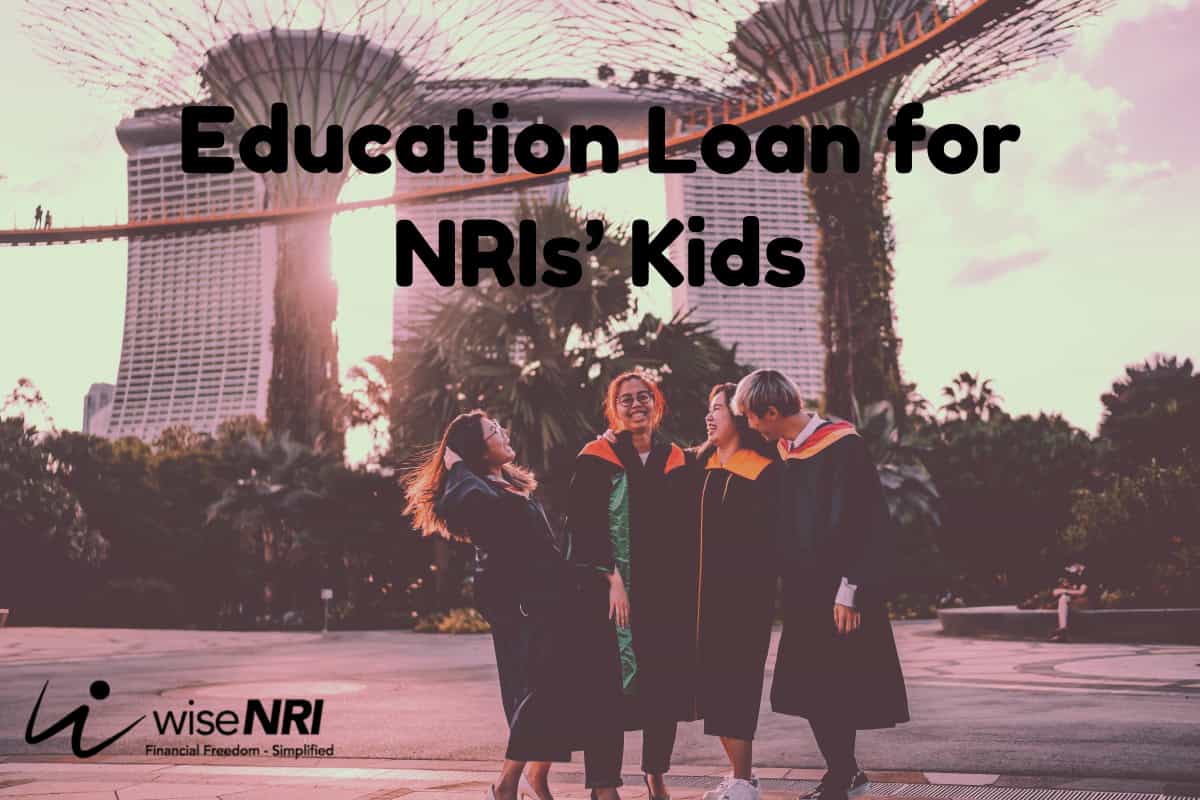In recent years, education costs, especially for quality higher education, have skyrocketed. The education in top Indian colleges/universities is high enough. But if your child wants to pursue education in an international university, then the costs can be up to 2 to 5 times higher.
To bridge the gap – between the available funds and the cost of higher education – banks and financial institutions offer education loans. Both public and private sector banks offer such loans at competitive rates as today’s students are tomorrow’s high-flying customers.
The education loan is available for not only students who are children of Resident Indians (RIs) but also for the wards of Non-resident Indians (NRIs). The terms and conditions, eligibility, documentation, and process are something that most NRI parents and their children fret about.

Must Read – Child Higher Education – Things NRIs should consider
Major Features and Benefits
Before you go and apply for an education loan, you must understand that you are taking this loan for investing in your child’s future. Despite that, it will remain a loan – a liability that you or your child would have to pay one day.
You can apply for education loans for higher studies in India as well as abroad with a loan tenure of up to 15 years. The competition is so fierce that doorstep document collection and filing service is offered by some financiers.
Major features and benefits of education loans for NRIs are:
- Tenure of up to 15 years.
- Financing is available up to Rs. 1 crore.
- For foreign education, some lenders may offer loan disbursement before you apply for a Visa.
- Certain banks offer concessional rates for female students.
- If you are an NRI working with a government agency or the bank itself, they offer preferential rates.
- There is a 1-year moratorium after you complete your course – no payments are required during this period.
- If you wish to pursue higher education, then you can get a second loan as well.
- Many banks also offer education loans for school education from Nursery to twelfth standard.
- You can get tax benefits up to eight years on the interest paid on the education loan for higher education. The interest amount is deducted from the total income u/s 80E of the Income Tax Act.
What all is Covered by Education Loans to NRIs?
When you go to study, the only expense that you worry about is the admission fee, tuition fee, and hostel charges. But there are many incidental expenses that you must account for as adding up they can be substantial.
Here is the list of all the expenses that you can get covered with an education loan:
- Admission and Tuition fees.
- Examination, laboratory, library, and other related fees.
- Lodging, Boarding, and Mess charges (Hostel fees).
- Caution or Security Deposit for College and Hostel.
- One-time a year Travel expenses for students studying abroad.
- Foreign Travel and Medical Insurance Premium.
- Cost of uniform, books, equipment, and instruments as per actual.
- Cost of a laptop if required for completion of the course.
- Expenses incurred as part of the course include study tours, paper publication charges, conference charges, thesis costs, and project work costs.
Types of Education Loans
The government mandate to promote higher education also envisages providing a simple loan facility for it. Therefore, education loans can be divided into three categories:
- Without guarantee and collateral: These loans are the most basic ones and have a limit of Rs. 4 lakhs.
- With guarantee but without collateral: For loan amounts between Rs. 4 and 7 lakhs, there is no need for collateral, but a third-party guarantee (usually from a parent or relative) is needed.
- Secured loans: As these loans are secured by collateral, the loan amount can go way higher depending on the course, university, and country of the program. You can use immovable property, RBI bonds, FDs, NSC, LIC policies, or UTI units as security.
Read – NRI Home Loan Guide
Eligibility
Courses Eligible for NRI education loans
Students enrolling in all under-graduate, post-graduate, and doctoral degree studies in schools, colleges, and universities are eligible for this facility. The programs must be recognized by UGC or the statutory body of the program/field. Students in technical and professional courses including diploma, postgraduate diploma, and certificate courses (of at least 6 months ‘ duration) are also eligible.
The following is a list of courses for which you can get an education loan to study in India and abroad:
- Architecture
- Veterinary Science
- Medicine & Surgery
- Dental Science
- Agricultural Sciences
- Engineering
- Technology
- Computer Science
- Business Administration & Management Sciences
- Hotel Management
- Department of Electronics, Government of India accredited computer courses offered by Indian institutes
- Course in Civil Aviation, Merchant Navy, and Logistics
- Course offered by professional bodies like ICAI (CA), ICSI (CS), CIMA UK, CPA USA
Please do remember that not all courses are eligible for education loans for the study abroad option. You may have to check with your banker for the latest list of courses and institutes that are eligible.
Student Eligibility
The student must be accepted to a reputed school/university to get the loan sanctioned. To become eligible for the loan, the academic background of the student is checked. This is to ensure that the student would complete the program.

Check – School Admission for Returning NRIs
NRI Education Loan Repayment
After the course completion, if you can land a job within six to 6-12 months, the repayment would begin after your first month of employment. Payments are generally made in EMIs over 5-7 years.
In some cases, the student may get an extension of up to 2 years to complete the course if they cannot complete the course within the specified duration.
Some parents also start repaying the loan from the time the loan is disbursed. This is especially helpful if your child is going for an expensive course, as they will have a lesser burden at the time of graduation.
Like any other long-term loan, we suggest that you take a term plan on the lives of the student as well as the guarantor of the loan. This will at least protect you financially in case something untoward happens to either of them. The sum assured should be at least equal to the sanctioned loan amount.
Penalties
Any late payments or defaults in loan repayment will result in a financial penalty. In addition to a fixed charge, you may be charged additional interest up to 2 percent.
If you fail to pay multiple EMIs in succession your loan could be categorized as an NPA (non-performing asset) and the guarantor or the collateral becomes responsible for the repayment. Not to mention, your credit score also goes into the sink.
Required Documents
- Photographs of the student and the guarantor.
- Loan application.
- Approved Visa for studying abroad.
- Marksheets of qualifying exam and last class studied.
- ID, Age, and Address proof for joint applicants.
- An admission confirmation letter with details of expenses and their schedule.
- Income proof of the parent/guardian – recent bank statement, ITR, salary slip, or audited balance sheet.
Using Property as Collateral?
- Latest property tax receipts.
- Original title deed.
- Property possession certificate from the local authority.
- Valuation certificate from the bank’s approved valuer.
- Certificate of encumbrance from the office of the sub-registrar.
- A title clearance certificate from the bank’s approved advocate.
Read – Financial Planning for Single Parents – Securing your Children’s future
Applying for Education Loan
Applying Online
Online applications are the simplest and most convenient way to apply. There are two ways to apply. A straightforward online application form is filled out online, documents are attached, and you submit the form.
The second option involves providing all of the requested information, and the lender will contact you to discuss the terms of the loan before approving your application.
Applying Offline
By visiting a branch, you can apply for a loan in person, provide the necessary documents, discuss the terms of the loan with a representative, and complete the application. You can also either call the lender or request a callback and a representative may visit your home.
In conclusion, securing an education loan for NRIs’ kids is a crucial step in ensuring their access to quality education abroad without burdening family finances. With various loan options available, including NRI-specific schemes and competitive interest rates, parents can plan their children’s future with confidence. By understanding eligibility criteria, repayment terms, and the application process, NRIs can unlock opportunities for their kids to pursue their academic dreams seamlessly.
Investing in education is one of the best gifts a parent can offer, and with the right financial tools, it becomes both manageable and empowering. Please share your experience in the comment section while taking education loan.
